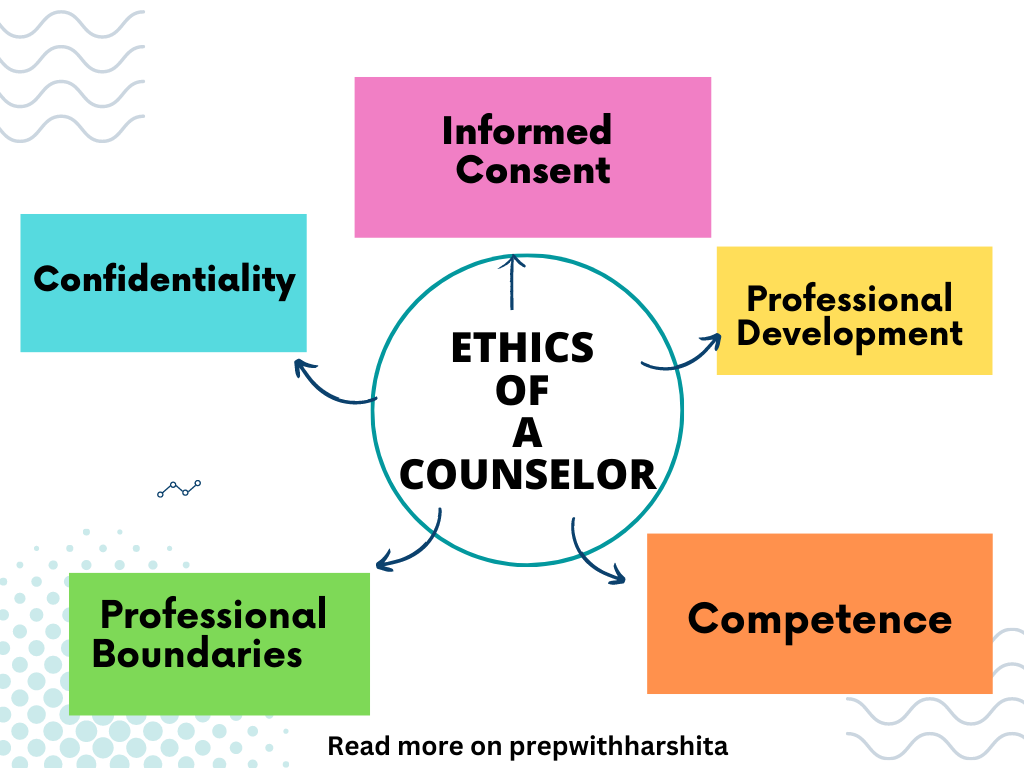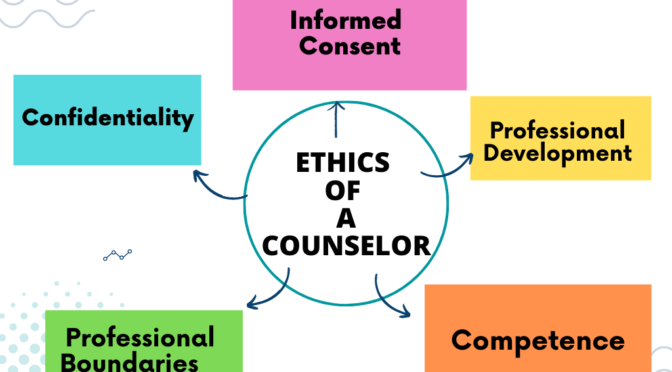A counselor is a trained professional who provides therapeutic support and guidance to individuals, couples, families, or groups facing various challenges and issues in their lives. The ethics of a counselor or therapist are of utmost importance as they guide the professional conduct and behavior of these individuals in their therapeutic practice.
Here are some key ethical principles that counselors typically adhere to:
- Confidentiality: Counselors have a legal and ethical duty to protect the confidentiality of their clients. They must not disclose any information shared by clients during counseling sessions. Unless there is a legal requirement or a clear and imminent threat to the client or others. Counselors should discuss the limits of confidentiality with clients at the beginning of the therapeutic relationship. It ensure a mutual understanding.
- Informed Consent: Counselors must obtain informed consent from clients before providing any counseling services. This involves explaining the nature and goals of counseling, the counselor’s qualifications, the methods used, the potential risks and benefits, and the client’s rights. Informed consent ensures that clients have the necessary information to make autonomous decisions about their treatment.
- Competence and Professional Development: Counselors are expected to possess the necessary knowledge, skills, and training to provide competent counseling services. They should stay informed about current research and best practices, engage in ongoing professional development, and seek supervision or consultation when needed. Maintaining competence is crucial for providing effective and evidence-based care.
- Multicultural Competence and Non-Discrimination: Counselors should strive to provide culturally sensitive and inclusive counseling services. They should be aware of their own biases, prejudices, and assumptions and actively work to eliminate discrimination in their practice. Multicultural competence involves understanding and respecting diverse cultural, ethnic, and social backgrounds and adapting counseling approaches accordingly.
- Professional Boundaries: Establishing and maintaining appropriate boundaries is vital in the therapeutic relationship. Counselors must be aware of power dynamics and avoid any exploitation, dual relationships, or conflicts of interest that may harm the client or compromise objectivity. They should maintain professional boundaries to ensure the focus remains on the client’s well-being.
- Duty to Warn and Protect: In situations where a client poses a serious threat to themselves or others, counselors have a duty to warn or protect potential victims. This may involve breaching confidentiality to ensure the safety of individuals who may be in danger. However, the process should be approached carefully and in accordance with legal and ethical guidelines.
- Ethical Decision-Making: Counselors often encounter complex ethical dilemmas in their practice. Ethical decision-making involves carefully considering the potential consequences of different courses of action, consulting with supervisors or colleagues, and following ethical guidelines and legal requirements. Counselors should strive to act in the best interest of their clients while upholding ethical standards.
- Professionalism and Integrity: Counselors are expected to demonstrate professionalism, integrity, and respect in their interactions with clients, colleagues, and the community. They should maintain high standards of ethical conduct, honesty, and accountability. Professionalism includes timely and accurate record-keeping, appropriate use of technology, and adhering to relevant laws and regulations.
- Self-Care: Counselors have a responsibility to take care of their own well-being and seek support when needed. By maintaining their own physical, emotional, and mental health, counselors are better equipped to provide effective care to their clients.
These ethical principles, when integrated into counseling practice, help ensure that clients receive competent, respectful, and ethical care while protecting the integrity of the counseling profession. Counselors are encouraged to familiarize themselves with the specific ethical codes of their respective associations or regulatory bodies. Also, engaging in ongoing ethical reflection and self-assessment.
Also Visit: Prep with Harshita

Also Read: Factors Affecting Mental Health


Thanks for telling me that the skills, expertise, and education required for successful counseling services are expected of counselors. You said that they must remain up to date on the most recent studies and recommended procedures, take part in continuous professional development, and seek out supervision or advice as necessary. Reading this made me want to check out a health coaching session near me. I’ve been struggling with my personal life lately and it’d been affecting my entire life.
Thanks for your article. My spouse and i have generally seen that most people are needing to lose weight since they wish to show up slim in addition to looking attractive. Even so, they do not generally realize that there are additional benefits so that you can losing weight as well. Doctors state that fat people suffer from a variety of illnesses that can be perfectely attributed to the excess weight. Fortunately that people who sadly are overweight as well as suffering from diverse diseases can reduce the severity of their particular illnesses by way of losing weight. It is easy to see a continuous but identifiable improvement with health when even a small amount of weight loss is realized.
this is unblocked agario games site. Thanks for your post
Thanks for retro post. Perfect design
diagnóstico de vibraciones
Sistemas de ajuste: importante para el funcionamiento estable y óptimo de las equipos.
En el entorno de la avances actual, donde la productividad y la fiabilidad del equipo son de alta importancia, los equipos de equilibrado tienen un función esencial. Estos aparatos dedicados están concebidos para balancear y estabilizar piezas giratorias, ya sea en maquinaria de fábrica, medios de transporte de traslado o incluso en dispositivos de uso diario.
Para los expertos en soporte de sistemas y los profesionales, trabajar con dispositivos de balanceo es importante para promover el desempeño estable y fiable de cualquier dispositivo dinámico. Gracias a estas alternativas modernas sofisticadas, es posible limitar sustancialmente las sacudidas, el sonido y la esfuerzo sobre los rodamientos, mejorando la vida útil de elementos caros.
De igual manera importante es el papel que tienen los aparatos de calibración en la asistencia al usuario. El soporte técnico y el soporte constante usando estos aparatos habilitan brindar prestaciones de alta nivel, aumentando la contento de los usuarios.
Para los propietarios de empresas, la aporte en unidades de equilibrado y medidores puede ser importante para optimizar la efectividad y eficiencia de sus equipos. Esto es particularmente importante para los empresarios que gestionan pequeñas y medianas emprendimientos, donde cada punto vale.
Asimismo, los sistemas de calibración tienen una vasta utilización en el campo de la prevención y el gestión de excelencia. Habilitan encontrar probables errores, previniendo reparaciones onerosas y averías a los dispositivos. También, los indicadores generados de estos equipos pueden emplearse para maximizar procesos y mejorar la exposición en plataformas de búsqueda.
Las campos de aplicación de los sistemas de balanceo abarcan múltiples áreas, desde la fabricación de bicicletas hasta el control de la naturaleza. No afecta si se trata de grandes elaboraciones productivas o reducidos talleres de uso personal, los aparatos de equilibrado son fundamentales para promover un desempeño productivo y libre de detenciones.
thanks for all. Unblocked always good.
thanks for details. Must visit unblocked web site
It was amasing post. Lets try to plau unblocked games
when i read this article, i got some useful information for me to learn. thank you for publishing this article.
I am lucky to have found this thank you and here is my site
so good I was lucky to have found this on Google and it helped me to estimate my website, please see Google this site i found this very lucky
I never expected to get information like this from your article, thank you very much for the information..
This article provides good information, thank you for publishing this article
Thank you very much for publishing this article, I can increase my insight about something like that.
Very informativeI wonder if there are any additional tips for choosing a truly trustworthy property agent? Sometimes choosing the right agent is as difficult as choosing the house itself.
Totally agree with the importance of understanding the legal aspects before buying a house. Many people focus only on price without considering the long-term risks. This article is insightful.
I really like the part about the importance of paying attention to the surrounding environment before buying a house. Details like this are often overlooked, but they are crucial.
Thanks for the info, I happen to be looking for references on this too. The explanation is quite clear and not complicated.
The discussion is neat and quite detailed. No regrets stopping by here.
Very interesting, I like the flowing way of writing. I want to read the other posts too.
Nice sharingHopefully you will continue to consistently create informative content like this
This is the type of content I’ve been looking for since yesterday. Thank you, it’s very helpful.
Thank you for sharing this useful content. I really liked the way you explained everything so clearly. I wrote something related recently as well
This article is very informative and covers the topic in great depth. I like the way the author presents the facts clearly.
The discussion in this article is very comprehensive and has increased my knowledge significantly.
This is an example of a good article, with in-depth research and clear delivery
With its sleek interface and flawless functionality, this platform delivers an exceptional user experience. Every detail is crafted with care, making togel 4d something that genuinely deserves recognition.
[b]Eliminate Vibration Issues and Improve Equipment Performance[/b]
Vibration is a silent killer of industrial machines. Imbalance leads to worn-out bearings, misalignment, and costly breakdowns. [b]Balanset-1A[/b] is the ultimate tool for detecting and correcting vibration problems in electric motors, pumps, and turbines.
[b]What Makes Balanset-1A Stand Out?[/b]
– Precise vibration measurement & balancing
– Compact, lightweight, and easy to use
– Two kit options:
[url=https://www.amazon.es/dp/B0DCT5CCKT]Full Kit on Amazon[/url] – Advanced sensors & accessories, Software for real-time data analysis, Hard carrying case
Price: [b]2250 EUR[/b]
[url=https://www.amazon.es/dp/B0DCT5CCKT][img]https://i.postimg.cc/SXSZy3PV/4.jpg[/img][/url]
[url=https://www.amazon.es/dp/B0DCT4P7JR]OEM Kit on Amazon[/url] – Includes core balancing components, Same high-quality device
Price: [b]1978 EUR[/b]
[url=https://www.amazon.es/dp/B0DCT4P7JR][img]https://i.postimg.cc/cvM9G0Fr/2.jpg[/img][/url]
Prevent unexpected breakdowns – Invest in [b]Balanset-1A[/b] today!